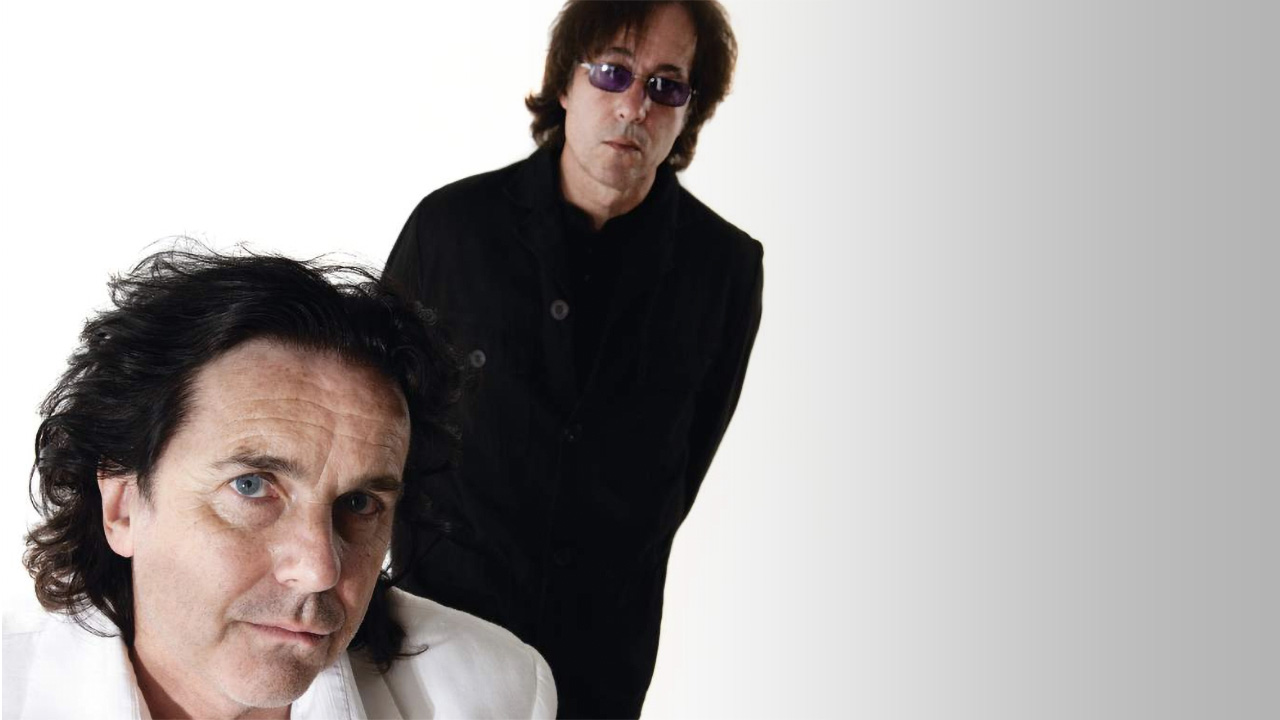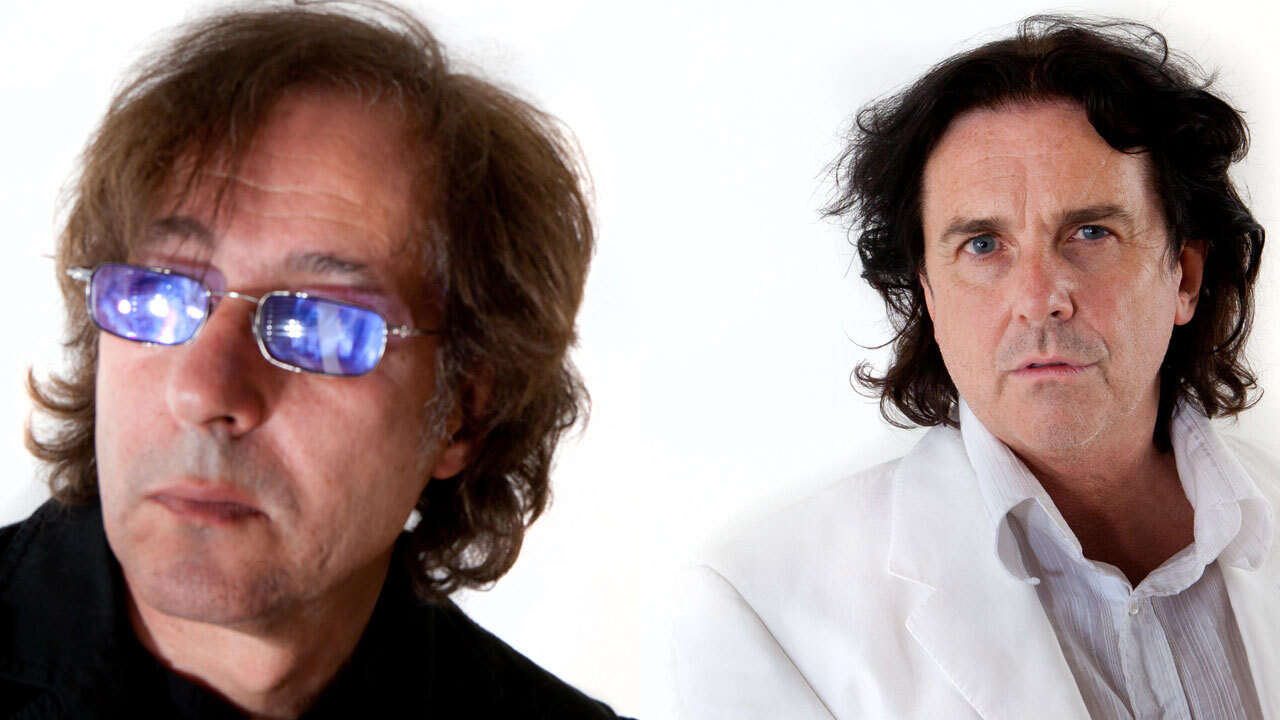“I’d have been up for having Slash on the album – but I’d have insisted he played the xylophone!” Steve Hogarth and Richard Barbieri pushed each other hard on their first album Not the Weapon But The Hand
Marillion vocalist found himself singing over drum’n’bass music on 2012 release, while Porcupine Tree keyboardist had to allow lyrics in a piece he’d wanted to be instrumental – but the result of years of effort satisfied them both

Select the newsletters you’d like to receive. Then, add your email to sign up.
You are now subscribed
Your newsletter sign-up was successful
Want to add more newsletters?

Every Friday
Louder
Louder’s weekly newsletter is jam-packed with the team’s personal highlights from the last seven days, including features, breaking news, reviews and tons of juicy exclusives from the world of alternative music.

Every Friday
Classic Rock
The Classic Rock newsletter is an essential read for the discerning rock fan. Every week we bring you the news, reviews and the very best features and interviews from our extensive archive. Written by rock fans for rock fans.

Every Friday
Metal Hammer
For the last four decades Metal Hammer has been the world’s greatest metal magazine. Created by metalheads for metalheads, ‘Hammer takes you behind the scenes, closer to the action, and nearer to the bands that you love the most.

Every Friday
Prog
The Prog newsletter brings you the very best of Prog Magazine and our website, every Friday. We'll deliver you the very latest news from the Prog universe, informative features and archive material from Prog’s impressive vault.
In 2012 Marillion’s Steve Hogarth and Porcupine Tree’s Richard Barbieri finally delivered an album they’d been hoping to make for years. Not the Weapon But The Hand pushed them both out of their comfort zones, and paved the way for 2023’s Waiting To Be Born. Ahead of their debut release they told Prog how it had come together at long last.
Marillion vocalist Steve ‘H’ Hogarth is reclining in an executive chair with his feet up on the desk. So is Richard Barbieri, better known as Porcupine Tree keyboardist, No-Man collaborator and former member of the groundbreaking band Japan. Hogarth grins apologetically: “Sorry, we were just comparing shoes!”
We’re at the London headquarters of their label KScope to talk about the duo’s first album together, Not The Weapon But The Hand. It’s quite clear they’re absolutely delighted with it. “This is the first copy we’ve seen,” the vocalist explains, pushing the finished product towards for closer inspection. “It’s completely knocked me out. I’m so proud of it... We’ve done a really good job, we really have!”
Let’s get one thing straight: this isn’t a Porcupine Tree instrumental with a guest singer. It’s a collaborative effort between two very talented musicians. Recorded over several years, this haunting eight-tracker refuses to conform to any expectations or rules – and it’s packed with so many Barbierian nuances that it’s hard to forget his electronic roots. Such aural tinkering has given Hogarth the perfect opportunity to get seriously creative in the vocal department; this is experimental progressive music in its truest sense.
The pair’s friendship dates back to 1996 when Porcupine Tree supported Marillion in London, and Hogarth – a huge Japan fan – asked Barbieri if he would perform on his solo album Ice Cream Genius. Although they kept in touch through subsequent shows and via Steven Wilson’s own involvement on Marillion’s Marbles album, it was an unexpected email from Barbieri that got the ball rolling again.
Hogarth recalls: “I was in Leeds on tour with Marillion, sitting in Starbucks with a coffee, and the email came through asking how I’d feel about making a record together. It didn’t take long for me to reply ‘absolutely’ and ‘how?’ Back in the 80s, I was in a band called The Europeans, and Tin Drum by Japan was one of the albums we used to listen to when we were on tour... if someone had told me then I’d end up working with Richard, I would have done a backflip and squealed with joy!”
Their hectic schedules meant that ‘working together’ was a little less straight-forward than the phrase implies. They sent files back and forth in their own time, and didn’t share the same space until their promotional photo shoot in Amsterdam.
Sign up below to get the latest from Prog, plus exclusive special offers, direct to your inbox!
The songs were based around a collection of haunting instrumentals that Barbieri had begun composing as far back as 2009. “I thought, ‘I want this kind of vocal on my music – I want to know what it sounds like,’” he explains. “I started writing and gradually fed him pieces of music and saw how it went from there. It’s kind of untampered-with in the sense that, once I’d passed the music on, what came back was almost a vocal production. There would be whispered voices and layered harmonies, a story going on over here and then a narrative, without any, ‘Could you change this, could you change that?’ The whole thing just came together and worked naturally.”
Barbieri wrote over the course of several winters – a season in which he feels most creative. Conversely, Hogarth wrote most of his vocals during the summer. “It hadn’t occurred to me until now that we were working at opposite times of the year,” he says. “There are quite a few examples of very dark instrumentals with light poured all over them – Only Love Will Make You Free is one. It has a very dark spine, but it’s completely enveloped in light. That’s what I was trying to do with the choruses and harmonies; make it all about light and wrap it around this dark, spooky spine. It was a happy accident.”
Hogarth recalls he listened to the emailed soundscapes in his car and allow them to provide the soundtrack for magical mystery tours around rural and urban landscapes. “The first thing Richard sent is now Red Kite. It’s about a feral creature that’s completely at odds with civilisation. While we’re driving up motorways at 100mph, this thing that’s part of nature hovers above us. It’s the double meaning of roadkill – commuting can kill you spiritually as well as physically.
“I wrote Naked like that as well; but then Crack is about being so obsessively in love with someone that you’re making them want to leave – I’d had that dark, almost nasty little lyric kicking about for ages and I wondered whether I could get it to work. Lifting The Lid was also something I’d had floating around for years. It was just three or four lines.”
I thought it would be quite nice to have Steve singing over drum’n’bass – it’s not the sort of thing he’d normally get to do!
Richard Barbieri
Barbieri interrupts: “That’s my favourite track on the album, actually – I didn’t really want a vocal on that. I was very precious about it and he knew that!”
Hogarth: “Yeah, when I was singing on it, I was conscious that I had to stay out of the way of the song because I knew he’d reject it. I just had a vision that I could make something special of it. I had to allow the music to live.”
Barbieri shines through on A Cat With Seven Souls and Crack – songs that feature elements of trip-hop and drum’n’ bass respectively. “I work from a lot of different musical areas and it feels right,” he says. “I like contemporary electronic music, and I always have done, so I tend to veer towards more trancy, hypnotic rhythms, often quite electronic and programmed.

“It’s the way I grew up in the 80s – everything was to a click or a track, so I suppose that’s a hangover. But they’re flavours; it’s not extreme. It’s not Aphex Twin, but the kind of music I listen to a lot works its way into my subconscious.” He adds with a grin: “And I thought it would be quite nice to have Steve singing over drum’n’bass – it’s not the sort of thing he’d normally get to do!”
Although Hogarth and Barbieri are the focus, contributors include double bassist Danny Thompson, XTC/Tin Spirits guitarist Dave Gregory, percussionist Arran Ahmun (ex-John Martyn band) and drummer Chris Maitland (ex-Porcupine Tree and No-Man). “We didn’t want to stop our characters from coming through,” Barbieri explains.
There’s always a danger that when you hear something that appeals to you immediately, you’ll tire of it quickly
Steve Hogarth
“The work had already been formed – certain moods and themes had already been set in stone and we didn’t want to veer too far away from that and bring in someone out of the blue, like Slash, for example.”
Hogarth lets out a snort of laughter: “I’d have been up for that. Although I would have insisted he played the xylophone!”
With Marillion due to begin work on their next album, to be followed by a lengthy tour, and Porcupine Tree currently on a break before regrouping to work on new material, it seems unlikely the pair will get the chance to take their collaboration out on the road.
“We’d like to,” Barbieri says, “but it’s a complicated process. Because the tracks weren’t constructed in a normal way, it’s not as if you can break it down and strum an acoustic guitar or sit down in front of a piano. There are ways of working it out, but it involves sitting down with loads of other people, probably.”
Only time and schedules will tell. “I’m really falling in love with the album now,” Hogarth grins. “There’s always a danger that when you hear something that appeals to you immediately, you’ll tire of it quickly. I hope this takes a few listens for people to get into.”

Contributing to Prog since the very first issue, writer and broadcaster Natasha Scharf was the magazine’s News Editor before she took up her current role of Deputy Editor, and has interviewed some of the best-known acts in the progressive music world from ELP, Yes and Marillion to Nightwish, Dream Theater and TesseracT. Starting young, she set up her first music fanzine in the late 80s and became a regular contributor to local newspapers and magazines over the next decade. The 00s would see her running the dark music magazine, Meltdown, as well as contributing to Metal Hammer, Classic Rock, Terrorizer and Artrocker. Author of music subculture books The Art Of Gothic and Worldwide Gothic, she’s since written album sleeve notes for Cherry Red, and also co-wrote Tarja Turunen’s memoirs, Singing In My Blood. Beyond the written word, Natasha has spent several decades as a club DJ, spinning tunes at aftershow parties for Metallica, Motörhead and Nine Inch Nails. She’s currently the only member of the Prog team to have appeared on the magazine’s cover.


